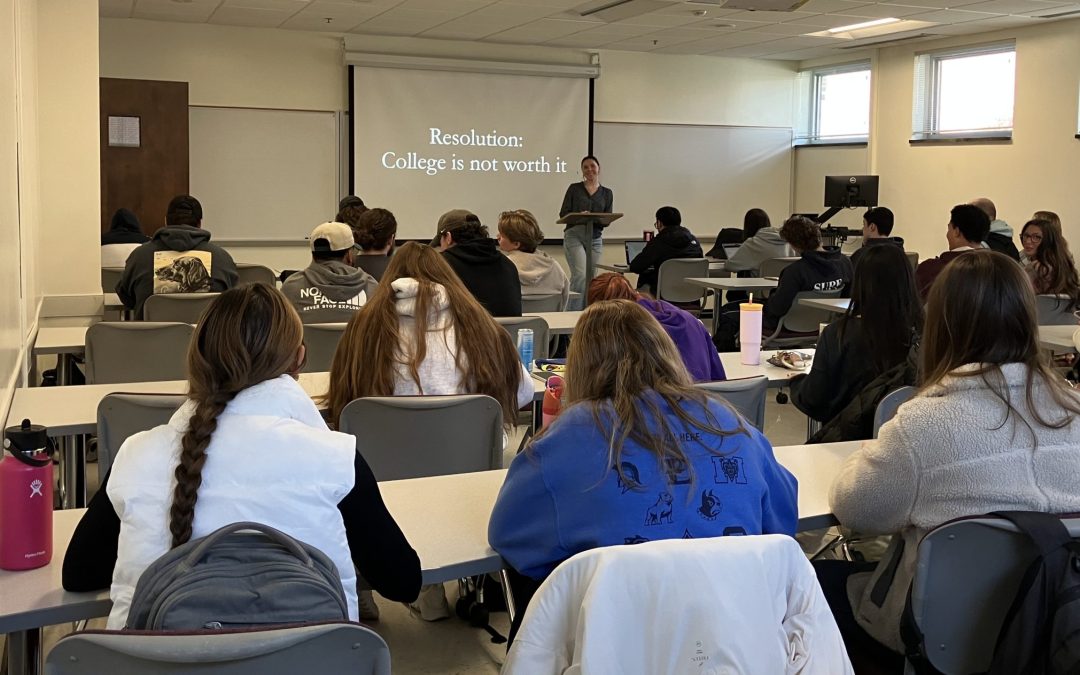
Classroom Debate Resolution: College is not worth it.
On November 12th, Emma Jutte chaired classroom debates in two introductory macroeconomics classes.
The resolution: College is not worth it.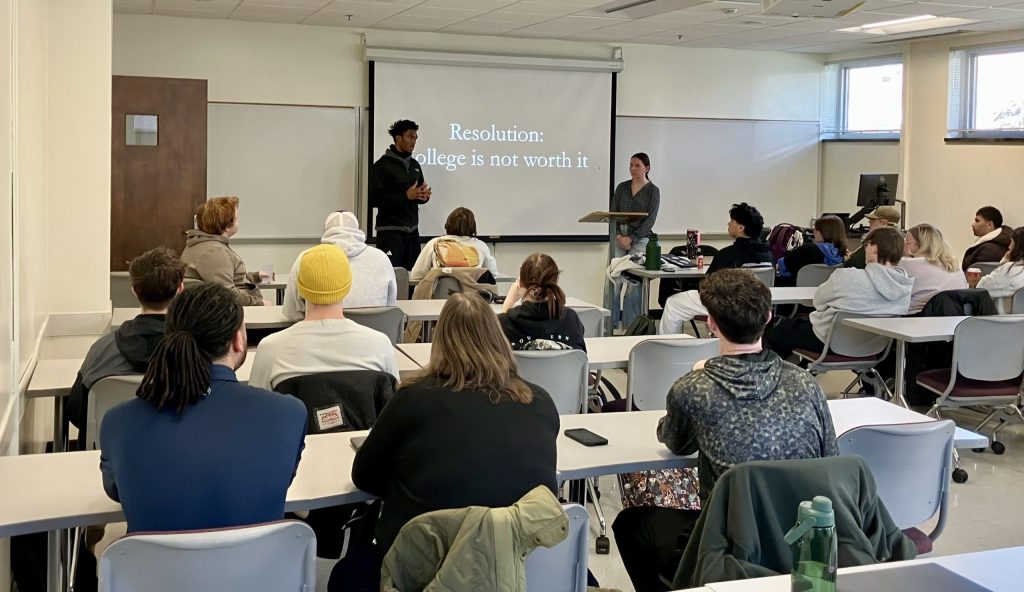
Students debated and discussed the importance of prestige, college location, admission standards, tuition and fees, choice of major, time invested, and options outside of a four-year college degree. Many students noted that college attendance only made financial sense because they were on an athletic or academic scholarship. Students discussed whether the focus of college should be financial or income from their first job. Others noted that many lessons would pay off later in life or other aspects of their lives.
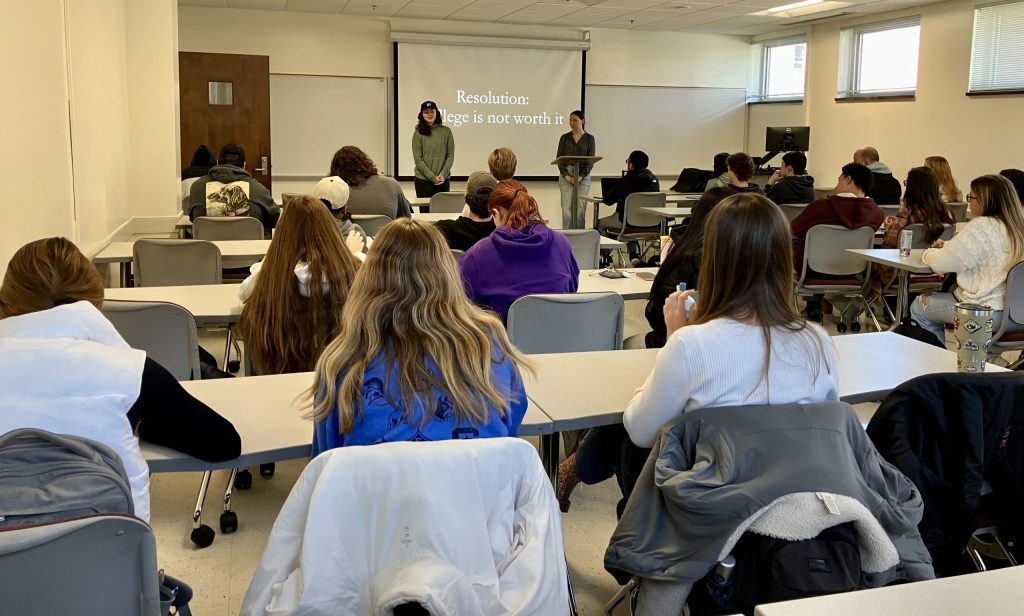 All participants respectfully listed to their classmates and asked valuable questions. Emma Jutte was an outstanding chair. She clearly described the format and goals of the debate and ensured that all were given an opportunity to present their ideas or ask questions of the speakers. Tryston Weiss served as whip to ensure those with unique perspectives were given an opportunity to present their ideas to the group.
All participants respectfully listed to their classmates and asked valuable questions. Emma Jutte was an outstanding chair. She clearly described the format and goals of the debate and ensured that all were given an opportunity to present their ideas or ask questions of the speakers. Tryston Weiss served as whip to ensure those with unique perspectives were given an opportunity to present their ideas to the group.
A big thank you to Mae Rum and Bryan Paul for their help and guidance.
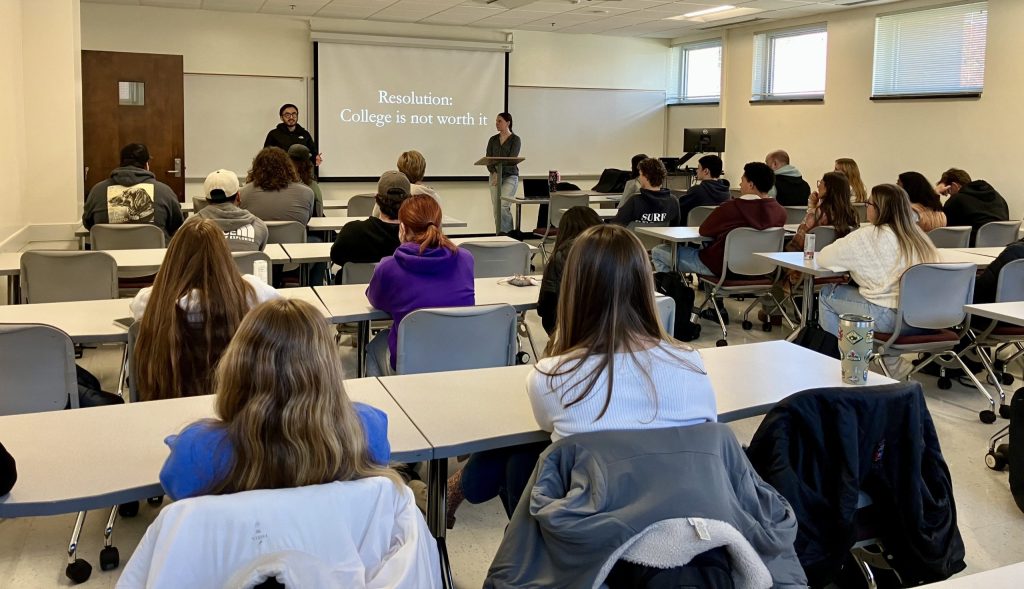
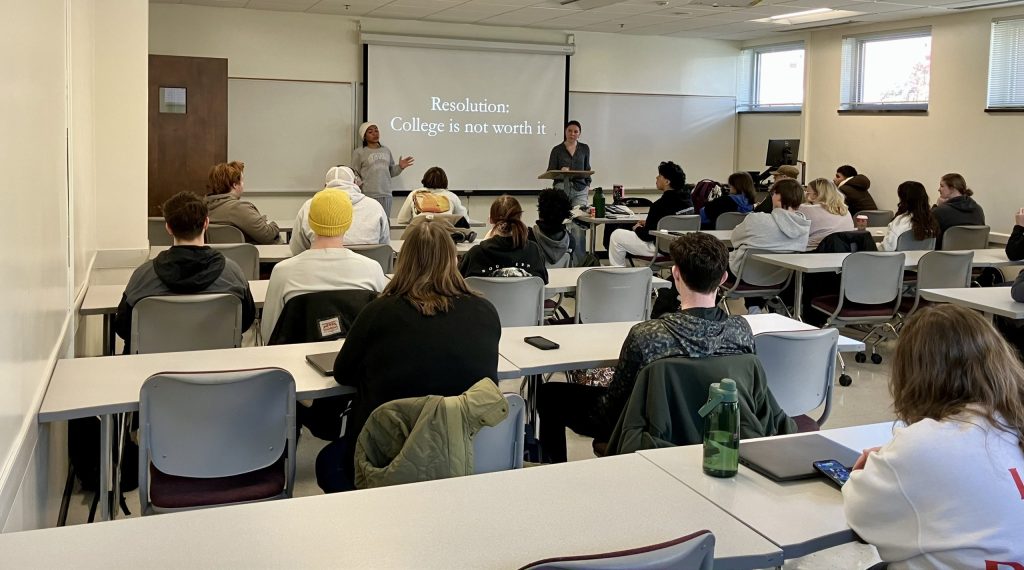
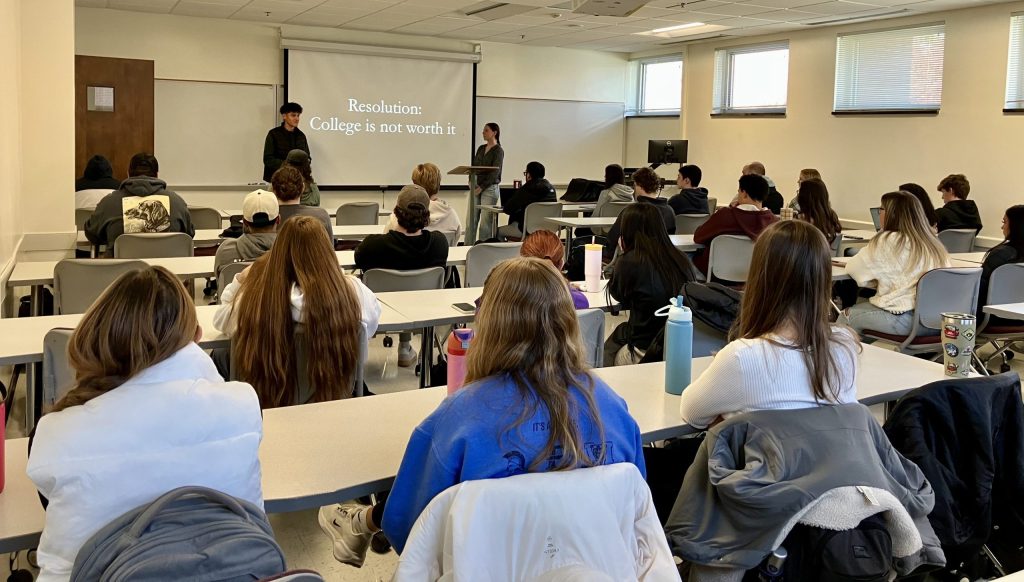
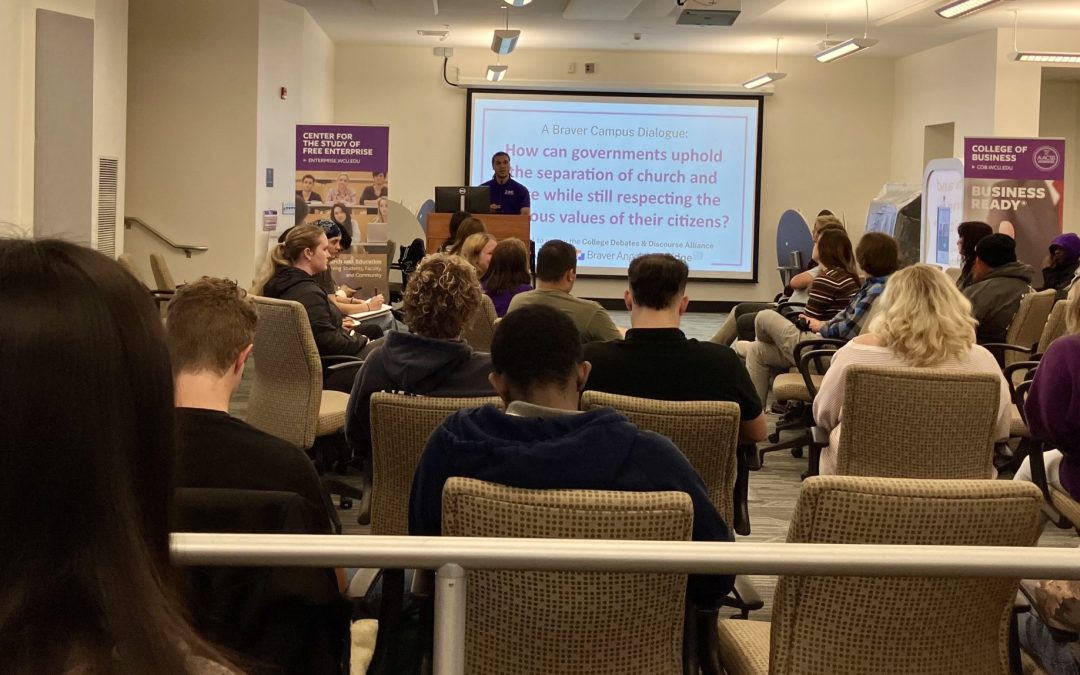
Campus-Wide Discussion: How to respect religious values while upholding the separation of the church and state
On October 27th, around 50 students, staff, and community members gathered to discuss the how to respect religious values while also ensuring the separation of church/temple/synagogue and state.
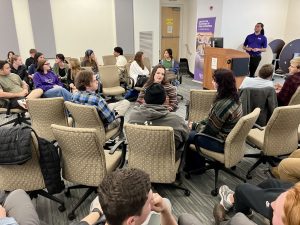 Participants discussed how many political views are often shaped by one’s religious views. Audience members considered how democracy might result in government policy that follows the doctrine of the most prevalent religious view. Speakers discussed ideas ranging from abortion, same-sex marriage, welfare, and taxes.
Participants discussed how many political views are often shaped by one’s religious views. Audience members considered how democracy might result in government policy that follows the doctrine of the most prevalent religious view. Speakers discussed ideas ranging from abortion, same-sex marriage, welfare, and taxes.
The discussion was led by Barnes Debate Fellow Tryston Weiss, who ensured that all speakers and audience members were given an opportunity to convey their views and ask respectful, yet probing questions. Banes Debate Fellow Emma Jutte ensured that audience members were given the opportunity to present their ideas to the entire audience as speakers. Many valuable insights were presented and debated.
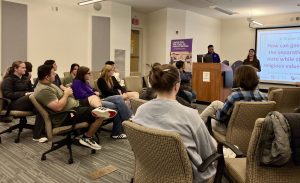 The CSFE would like to thank Mae Rum, Whitney McCall, Bryne Murphy, and Melanie Lewis for ensuring the event was a success!
The CSFE would like to thank Mae Rum, Whitney McCall, Bryne Murphy, and Melanie Lewis for ensuring the event was a success!
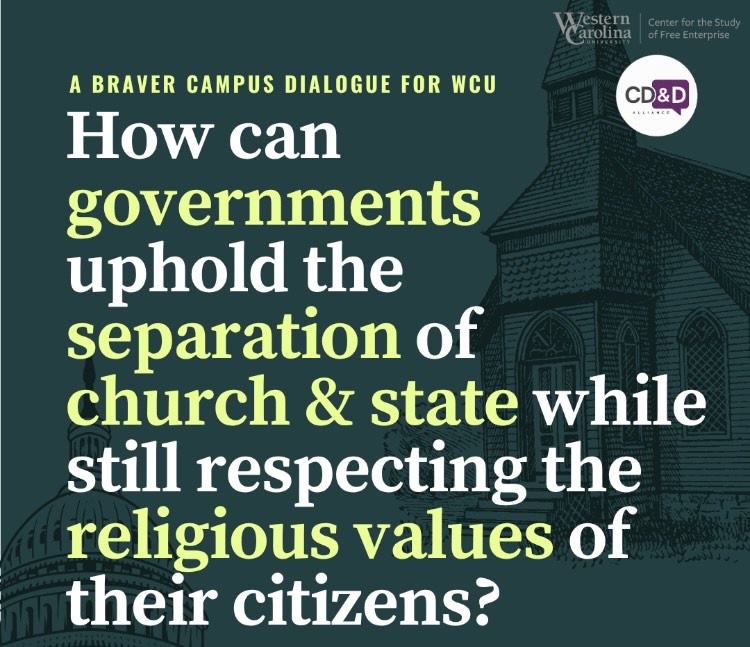
Campus-Wide Dialogue: Religious Values and the Separation of Church and State
Join us on October 27th at 6pm to discuss the how we can respect religious values while also ensuring the separation of church/temple/synagogue and state.
Food will be served at 6pm. The discussion starts at 6:30 pm in Forsyth 101.
Please register here: A Braver Campus Dialogue – Western Carolina University Tickets, Mon, Oct 27, 2025 at 6:30 PM | Eventbrite.
All campus community members are welcome!
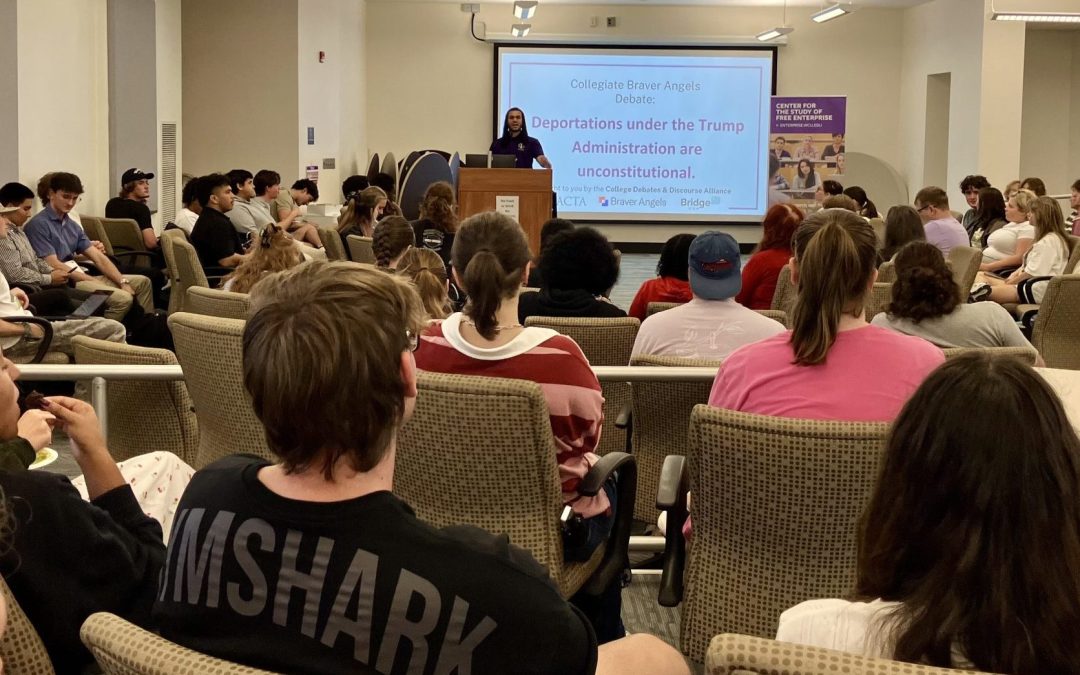
Are Deportations Under the Trump Administration Unconstitutional? A Campus-Wide Debate
On September 24th, over 75 students, faculty, staff, and community members gathered to debate:
“Are Deportations Under the Trump Administration Unconstitutional?”
All participants offered excellent, concise, and well-supported views on a wide range of topics related to deportations. 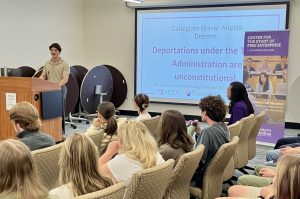 Many speakers cited the Fourth Amendment to the U.S. Constitution, which protects against unreasonable search and seizure. Others noted the importance of the Fifth Amendment, which says that no person can be “deprived of life, liberty, or property without due process of law.” Others noted the pain and suffering experienced by those who must live and work in the underground economy because of their legal status. Presenters suggested that although they came here in hope of a better life, they might be better off returning to the country of their birth.
Many speakers cited the Fourth Amendment to the U.S. Constitution, which protects against unreasonable search and seizure. Others noted the importance of the Fifth Amendment, which says that no person can be “deprived of life, liberty, or property without due process of law.” Others noted the pain and suffering experienced by those who must live and work in the underground economy because of their legal status. Presenters suggested that although they came here in hope of a better life, they might be better off returning to the country of their birth.
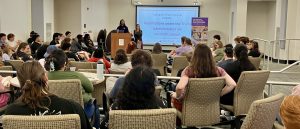 Recent Supreme Court cases were also discussed. Many presenters offered in-depth analysis of the case of Abrego Garcia, who was removed from the United States while also subject to a withholding order that forbade his removal to El Salvador.
Recent Supreme Court cases were also discussed. Many presenters offered in-depth analysis of the case of Abrego Garcia, who was removed from the United States while also subject to a withholding order that forbade his removal to El Salvador.
Speakers discussed why and why not the Alien Enemies Act section of the Alien and Sedition Acts of 1798 pertain to the current environment. The Alien Enemies Act enables the President to detain or deport the natives and citizens of an enemy nation during wartime without a hearing. Participants also discussed and debated whether and to what extent the laws of the United States, such as the Due Process Clause, extend to people who are not U.S. citizens.
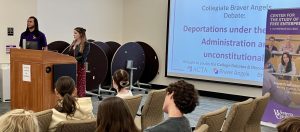 Successful debates on potentially contentious issues are only possible with well-prepared facilitators. Lee Barnes Family Foundation Fellow, Tryston Weiss, served as an expert chair. He carefully and calmly ensured that each questioner and speaker remained respectful throughout the debate.
Successful debates on potentially contentious issues are only possible with well-prepared facilitators. Lee Barnes Family Foundation Fellow, Tryston Weiss, served as an expert chair. He carefully and calmly ensured that each questioner and speaker remained respectful throughout the debate.
Lee Barnes Family Foundation Fellow, Emma Jutte, served as the debate Whip and ensured all audience members were given an opportunity to present their views to those in attendance. She also encouraged participants to ask questions of the speakers.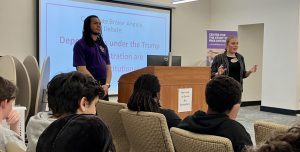
The Center for the Study of Free Enterprise thanks our co-sponsors and supporters: College Debates and Discourse Alliance, Braver Angels, ACTA, the Barnes Family Foundation, Mae Rum, Kayla Johston, and Bryan Paul. The event would not be possible without the assistance of Melanie Lewis, Whitney McCall, Brynne Murphy, and Sharron Crain.
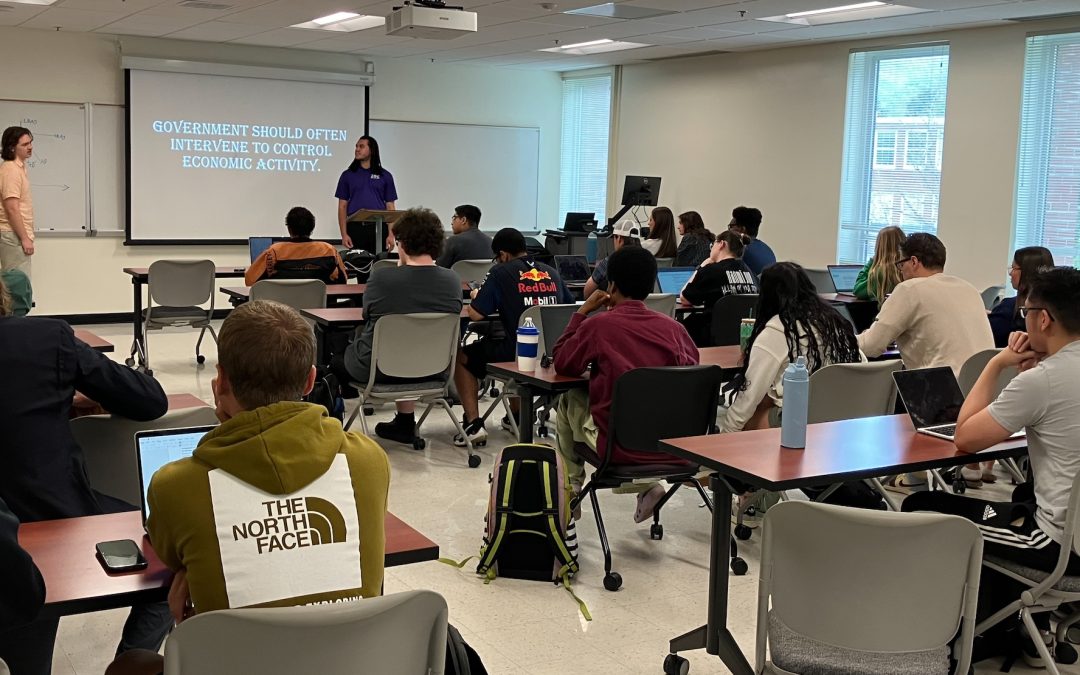
Classroom Debate: Government should often intervene to control economic activity
 As part of the Center for the Study of Free Enterprise’s goal of enhancing free and open discussion and debate, the Barnes Student Fellows, Tryston Weiss and Kevin Lavery, led two classroom debates on April 29th.
As part of the Center for the Study of Free Enterprise’s goal of enhancing free and open discussion and debate, the Barnes Student Fellows, Tryston Weiss and Kevin Lavery, led two classroom debates on April 29th.
The resolution was: Government should often intervene to control economic activity.
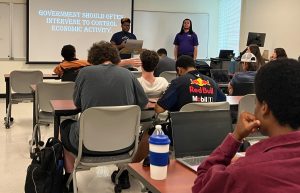 Presenters discussed when it was appropriate to intervene. Many students suggested the government should intervene when there is monopoly power, when there is an economic downturn, when inequality is too large, and when trading partners are not treating US producers fairly. Participants asked detailed questions about what criteria must be met so that government should intervene: How much of an economic downturn requires government action? How much inequality is too much? When is a producer a monopolist? What type of trade actions are unfair?
Presenters discussed when it was appropriate to intervene. Many students suggested the government should intervene when there is monopoly power, when there is an economic downturn, when inequality is too large, and when trading partners are not treating US producers fairly. Participants asked detailed questions about what criteria must be met so that government should intervene: How much of an economic downturn requires government action? How much inequality is too much? When is a producer a monopolist? What type of trade actions are unfair?
Others focused on what the government should do if the threshold for intervention is met. Should the government increase spending or lower taxes? Should the government breakup a firm? How? Should governments increase taxes on those with high incomes or offer tax credits to lower income workers? Should the US place trade restrictions on country’s unwilling to trade fairly with US producers?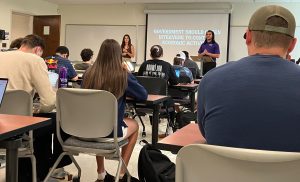
In the debrief, students were pleased that they were given the opportunity to express their views. They also appreciated that everyone listened respectfully and asked clarifying questions.
The debate would not have been possible without Tryston Weiss’s steady leadership as chair and Kevin Lavery’s work as whip. This is sadly Kevin’s last event as a Barnes Student Fellow as he will be graduating in a few weeks. We will miss working with him and are excited about his future endeavors!
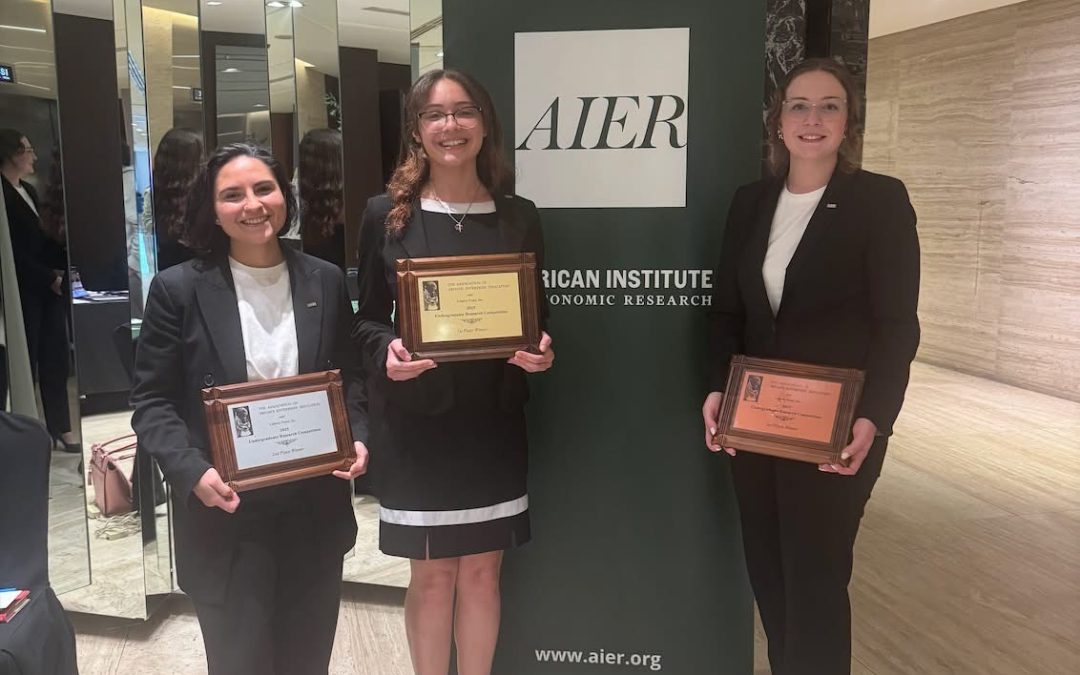
Diana Esters wins 1st Place!
The Center for the Study of Free Enterprise wants to congratulate Diana Esters (middle) for earning 1st place in the undergraduate research poster session at the 49th annual Meeting of the Association of Private Enterprise Education in Guatemala City for her project titled: “Graduated vs. Flat Personal Income Taxes: State Level Estimates on Output”!
Diana Esters was a Barnes Debate Fellow for the CSFE at Western Carolina University from 2023-2024, graduated in the fall of 2024 with a degree in Economic Analysis, served as a research intern at the American Institute for Economic Research, and is currently a spring 2025 fellow at The Fund for the American Studies. Ms. Esters has accepted a fully funded offer to continue her economic education and research at Montana State University.
Learn more about Diana here: Graduate Spotlight: Diana Esters (WCU 2024) | Center for the Study of Free Enterprise
Photo Credit: American Institute for Economic Research
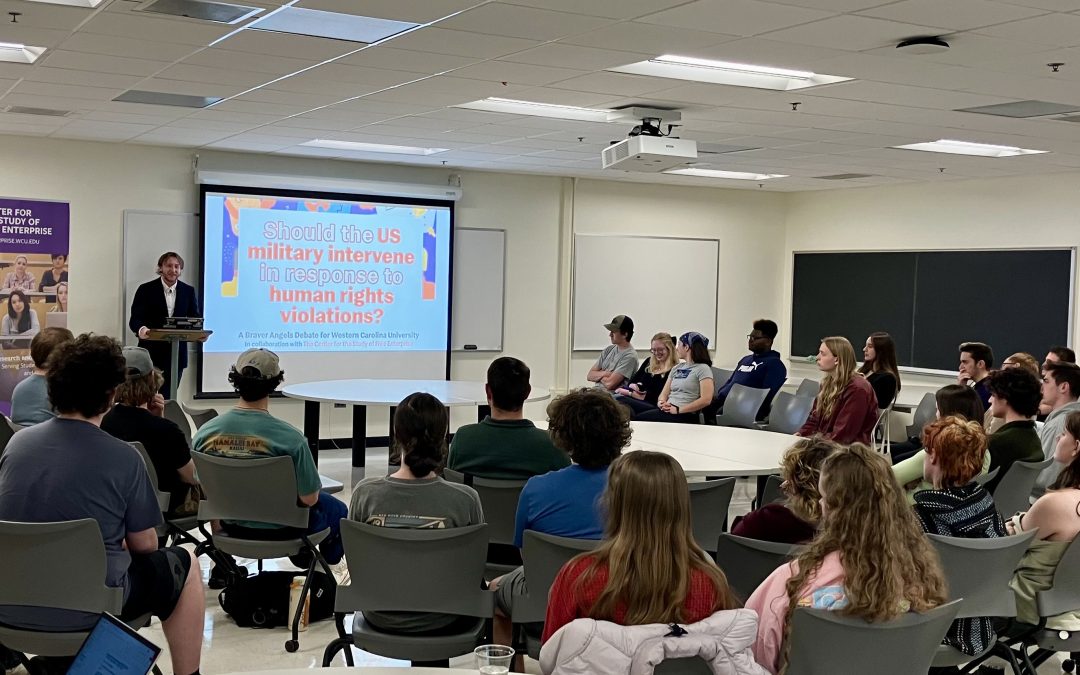
Human Rights Violations and US Military Intervention: A Campus-Wide Debate
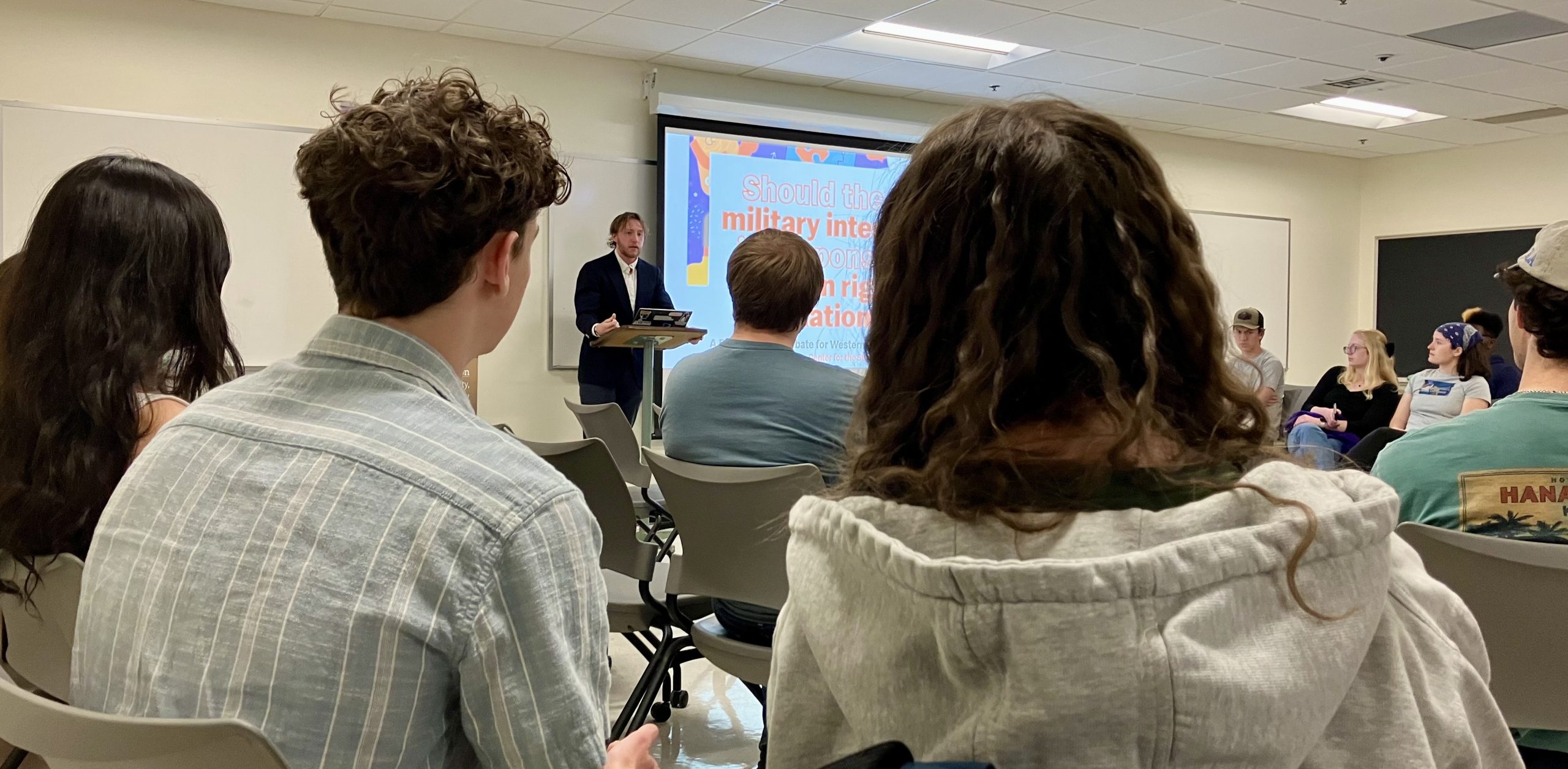 On March 26th, over 40 students gathered to discuss whether – and when – human rights violations justify U.S. military intervention. Four students kicked off the debate by presenting two speeches in the affirmative and two speeches in the negative. Students discussed the current war in Ukraine, the Israel-Palestinian conflict, the civil war in Sudan, the unrest in Yemen, and the violence in South Africa. 
On March 26th, over 40 students gathered to discuss whether – and when – human rights violations justify U.S. military intervention. Four students kicked off the debate by presenting two speeches in the affirmative and two speeches in the negative. Students discussed the current war in Ukraine, the Israel-Palestinian conflict, the civil war in Sudan, the unrest in Yemen, and the violence in South Africa. 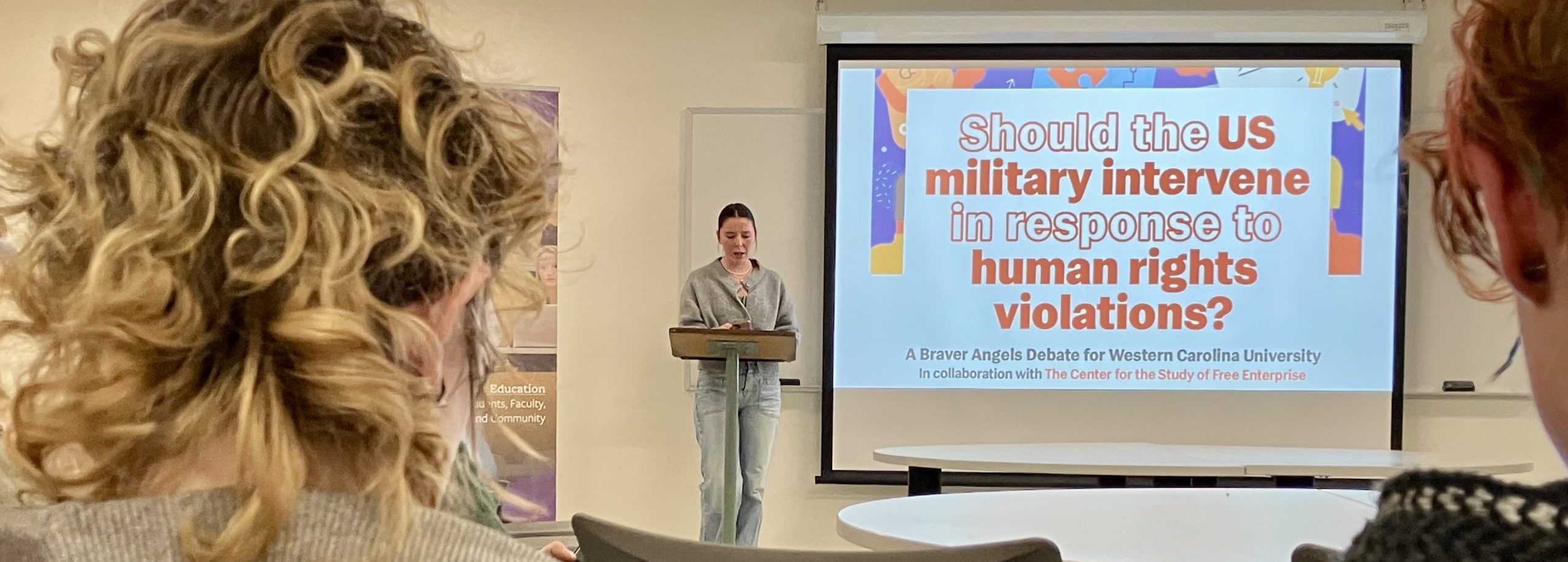
Students civilly debated when and why the United States might decide to provide military equipment, military expertise, or even troops on the ground. Participants also discussed if and when other types of interventions, such as economic or political, might be morally justified. 
Kevin Lavery was outstanding as chair. He ensured all speakers were given ample time to speak and focused on making sure all audience members were a chance to ask their questions or offer their suggestions. Tryston Weiss did an excellent job as  whip and ensured those that had more detailed ideas were given the opportunity to present them to the group. Over 75% of the participants offered their ideas or asked a question. There was never a pause in the debate! On behalf of the CSFE, I want to thank Braver Angels, Mae Rum of the Debates and Discourse Alliance, and the Barnes Family Foundation for supporting important dialogue on campus.
whip and ensured those that had more detailed ideas were given the opportunity to present them to the group. Over 75% of the participants offered their ideas or asked a question. There was never a pause in the debate! On behalf of the CSFE, I want to thank Braver Angels, Mae Rum of the Debates and Discourse Alliance, and the Barnes Family Foundation for supporting important dialogue on campus.

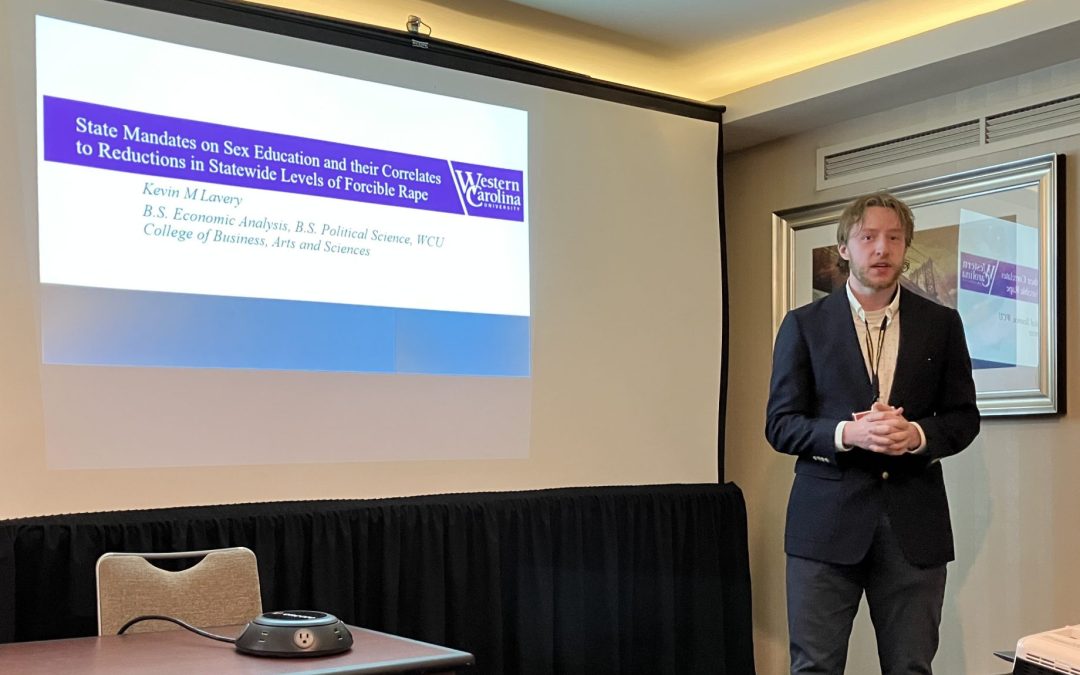
Kevin Lavery Presents His Research Paper at the Eastern Economic Association Conference
On Saturday, February 22, 2025, Kevin Lavery presented his paper, “State Mandates on Sex Education and their Correlates to a Reduction in the Rate of Forcible Rape” in a faculty session at the Eastern Economic Association Meetings in New York City. Kevin’s paper analyzes the effect of state mandated sex education on the prevalence of forcible rape within states.
Using a traditional two-way fixed effects regression, Kevin finds that state mandates on sex education have a negative relationship to the rate of forcible rape. Holding all other variables constant, states with sex education mandates have 2.60 fewer reports of forcible rape per 100,000 citizens on average or roughly a 7% decline at the mean relative to states that do not have mandates on sex education.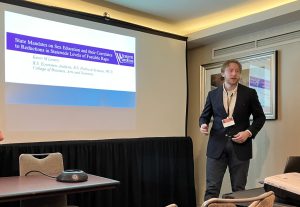
Kevin then analyzes the timing of the effects to see how quickly these sex education mandates are associated with declines in forcible rape. He finds that these declines do not take place until eight or nine years after the sex education mandates are instituted.
Because the timing of sexual education mandates differs across states, two-way fixed effects regressions may result in bias estimates. To address this, Kevin uses the Callaway Sant’Anna (2020) and the Goodman-Bacon (2019) difference-in-differences estimation specifications to adjust for problems caused by differential treatment timing. In four of the five specifications using these estimation techniques, Kevin continues to find statistically significant declines in forcible rape following sexual education mandates.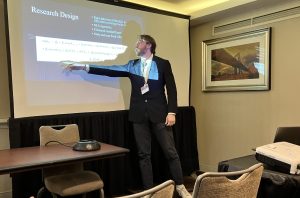
Kevin did an outstanding job presenting his findings in a clear and concise manner. Many of those in the session commended Kevin on his approach and methodology. I am excited to support and follow Kevin as he continues to conduct research as an economics graduate student in the fall of 2025.
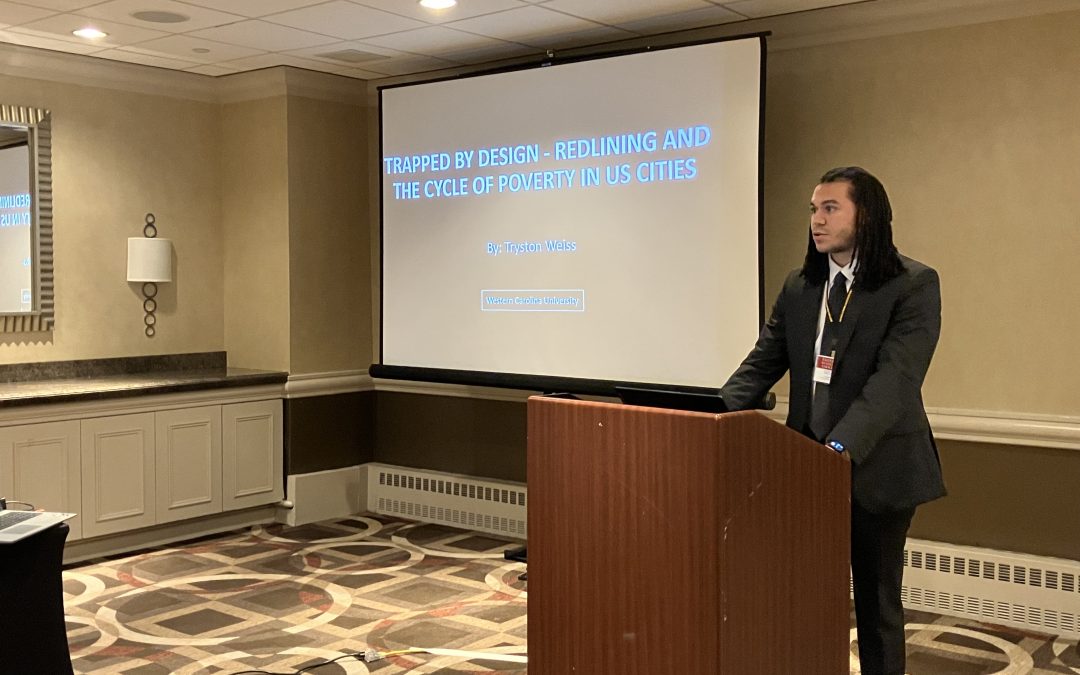
Tryston Weiss Presents His Undergraduate Research Paper at the Eastern Economic Association Conference
On Saturday, February 22, 2025, Tryston Weiss presented his paper, “Trapped by Design: Redlining and the Cycle of Poverty in the US Cities” at the Issues in Political Economy Undergraduate research sessions at the Eastern Economic Association Meetings in New York City. Tryston’s paper investigates how mortgage investment risk grading implemented by the Home Owners’ Loan Corporation (HOLC) in the 1950s is associated with lower income in 2010, and lower income growth between 1950 and 2010.
In the 1950s a series of mortgage investment risk maps were issued by the Home Owners’ Loan Corporation (HOLC) to provide potential lenders with a measure of risk at the census tract level. Those deemed riskier witnessed less opportunity for additional housing investment and therefore had less access to mortgage loan markets. Using Lee and Lin’s (2018) GIS based crosswalk to match 1950 Census tracts to 2010 Census tracts, Tryston finds that those deemed riskier in 1950 have lower average household income percentile ranks in 2010. 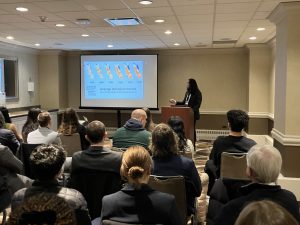
However, the HOLC risk measure are an aggregation of many characteristics of the Census tract. To focus on the portion of the HOLC measure that may be due to racial discrimination, Tryston uses a two-stage estimation technique where he regresses the HOLC measure on economic characteristics that are often used when assessing credit worthiness for a mortgage, such as household income, average house value, and the average age of the home along with a measure of the share of those who are African American. This enables him to estimate the portion of the HOLC measure that is associated with racial discrimination. He then uses this racial discriminatory portion of the HOLC measure and finds that a standard deviation increase in the African American discriminatory component of the mortgage risk measure is associated with a 6.4 percentage point decline in the household income percentile rank of a census track from 1950 to 2010.
Tryston’s presentation was clear, well organized, and well received. He gained valuable feedback from his discussant and many audience members. Excited to see how Tryston incorporates these suggestions during the second half of his independent research class this spring.
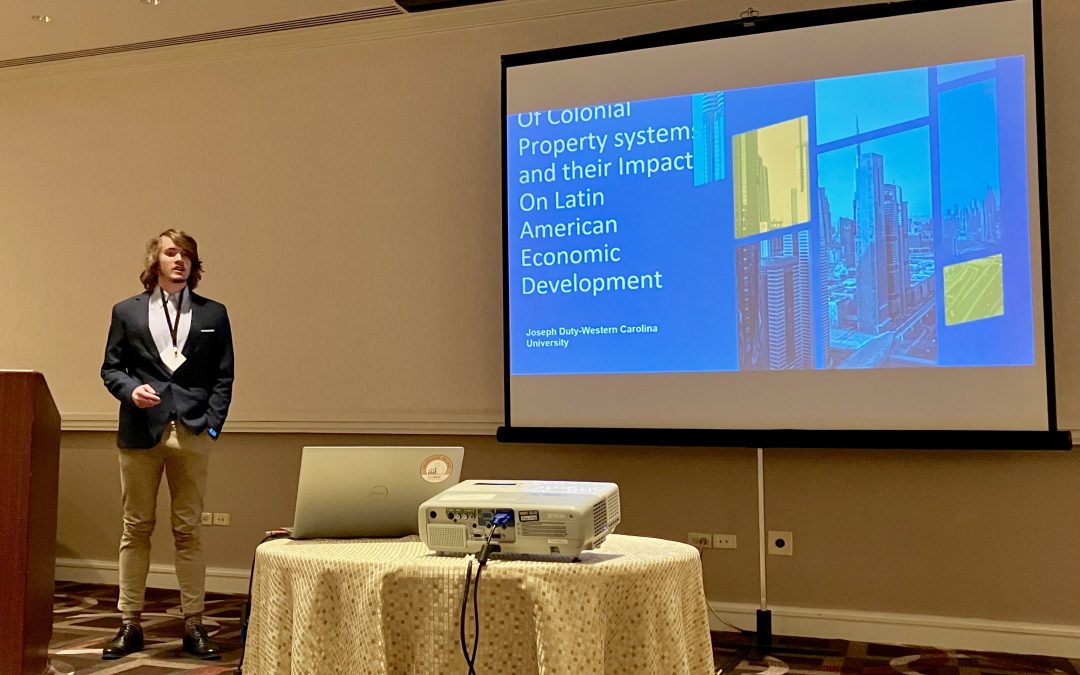
Joseph Duty Presents His Undergraduate Research Paper at the Eastern Economic Association Conference
On Friday, February 21, 2025, Joseph Duty presented his paper on the “Unintended Consequences: How the Different Implementations of Colonial Property Systems by the Spanish Effect Latin American Economic Development Today” at the Issues in Political Economy Undergraduate research sessions at the Eastern Economic Association Meetings in New York City. Joseph’s paper classifies former American Spanish territories into four categories based on their colonial property rights systems: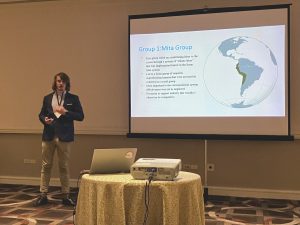
- The Mita Group: the Incan territory which saw the Spanish use a property system based on Incan traditions,
- Hacienda Group: the agrarian Hacienda system implemented by the Spanish in Central America,
- The Repartimiento Group: the initial territory of New Spain, now modern-day Mexico, where debt patronage was a common,
- The US States Group: the former Spanish territory that was seized by the United States in the Mexican American War.
He then investigates the relationship between these property rights regimes and current measures of economic development, human flourishing, and inequality. He finds that the historical property rights regimes under colonial rule still play a role in the current economic conditions of each of these regions. Joseph’s presentation was well received, and he gain valuable feedback from his discussant and many audience members.
